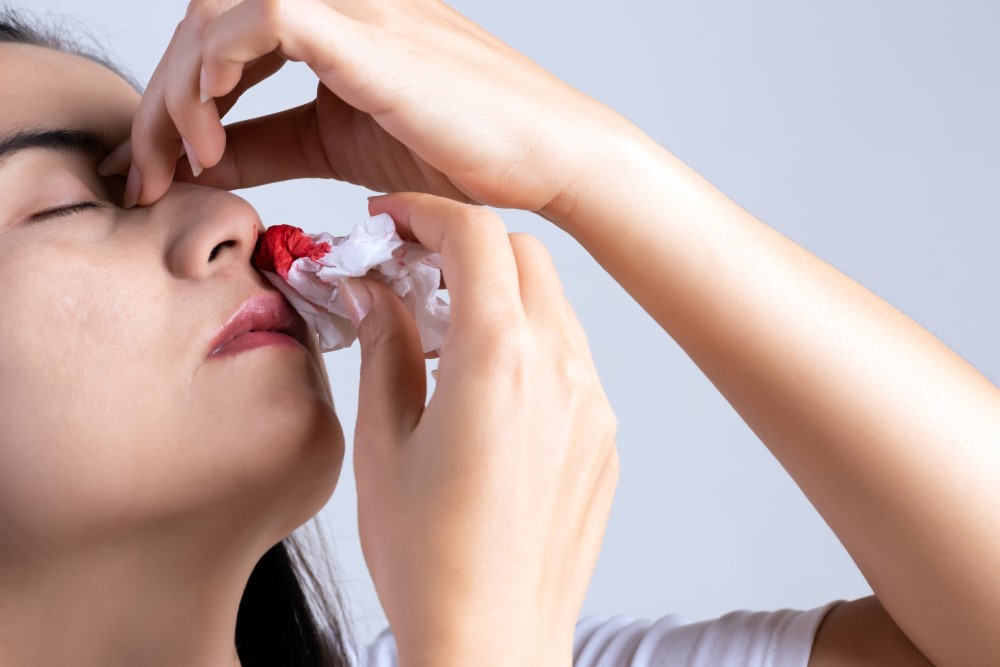Epistaxis, commonly known as a nosebleed, can disrupt everyday life, making it troublesome for many. A nosebleed might seem minor, but the sudden sight of blood can be unsettling. Understanding epistaxis causes is crucial, especially in countries like India, where climate factors like dry weather and pollution often exacerbate the problem. This blog seeks to guide you on epistaxis how to stop, prevention tactics, and when to seek medical help. By gaining these insights, you can manage and even prevent nosebleeds effectively, enhancing your daily comfort.
Understanding the Causes and Risk Factors of Epistaxis
Dry weather and pollution are significant triggers for nosebleeds, especially during the dry months. When the air lacks moisture, it can dry out the nasal membranes, causing them to crack and bleed. Pollution adds another layer of irritation. Airborne particles can settle in the nose, leading to dryness or irritation, often resulting in nosebleeds.
Beyond environmental factors, several health issues play a role too. Conditions such as hypertension are common epistaxis risk factors. High blood pressure can cause the delicate vessels in your nose to burst, leading to a nosebleed. Additionally, blood disorders like hemophilia can increase the likelihood of bleeding episodes. These disorders mean the blood doesn’t clot normally, making even minor injuries prone to more severe bleeding.
Certain medications have side effects that trigger nosebleeds. Blood thinners, prescribed for various heart conditions, keep blood from clotting efficiently. Also, frequent use of nasal sprays can dry out the nasal passages. If you experience regular nosebleeds and are taking medications, discussing alternates with your doctor may help mitigate this risk.
Thus, the combination of environmental factors, underlying health conditions, and medication can form a potent mix of epistaxis complication causes. Understanding these factors can help you take proactive steps towards effective nose bleed prevention.
Prevention: Lifestyle Changes and Home Remedies to Manage Epistaxis
Adapting your lifestyle is one of the best ways to prevent nosebleeds. Keeping the nasal passages moist is essential. Using a humidifier at home can add moisture to the air, preventing the drying out of your nasal membranes. Similarly, saline sprays are quick to use and help keep the nasal area damp. They are both simple to incorporate into your routine.
Lifestyle adjustments also play a critical role in epistaxis prevention. Limiting alcohol intake and quitting smoking are not just beneficial for your nose but also improve overall health. Alcohol and smoke dry out the nasal membranes and make blood vessels more fragile.
Managing stress is another key aspect. Stress can increase blood pressure, a known epistaxis risk factor. Simple techniques such as meditation, deep breathing exercises, or even regular mild exercise can ease stress and keep a check on blood pressure.
Nutrition and hydration play supportive roles in nose bleed prevention. Eating a balanced diet rich in vitamins, particularly Vitamin C, strengthens the blood vessels. Drinking enough water ensures your body stays hydrated, reducing the likelihood of your nasal membranes drying out.
A helpful quick list for prevention includes: 1. Use humidifiers regularly. 2. Apply saline sprays daily. 3. Limit alcohol intake. 4. Quit smoking. 5. Manage stress effectively. 6. Maintain good nutrition and hydration.
Following these steps can help to create a holistic approach towards managing and preventing nosebleeds effectively.
Seeking Professional Help and Dispelling Myths About Nosebleeds
While most nosebleeds are harmless, there are situations when seeking professional help is necessary. If a nosebleed lasts longer than 20 minutes or occurs frequently, it’s time to consult a doctor. Also, if a nosebleed follows an injury or if you suspect a epistaxis complication like a foreign object lodged in the nose, seek medical attention promptly.
Many myths surround nosebleeds. A common one is that tilting the head back can stop the bleeding. This method is incorrect and increases the risk of swallowing blood. Instead, pinch your nose and lean forward, which is a known first aid management for nose bleeding.
There is also a misconception that only children and seniors suffer from nosebleeds. The truth is, nosebleeds can affect anyone. Another myth is that applying heat can help stop a nosebleed when in fact, applying a cold compress is more effective.
Understanding these misconceptions improves your approach to epistaxis how to stop and the emergency nosebleed treatment. Recap the learned strategies and implement them when needed. Prevention methods, lifestyle changes, and timely medical help can significantly lower the occurrence and discomfort of nosebleeds.
By implementing the strategies discussed in this guide, you can confidently manage your nosebleeds, ensuring they don’t disrupt your routine. For more insights and updates, stay engaged with community forums or healthcare updates. Share your experiences too, as real-life tips often offer the best solutions.
